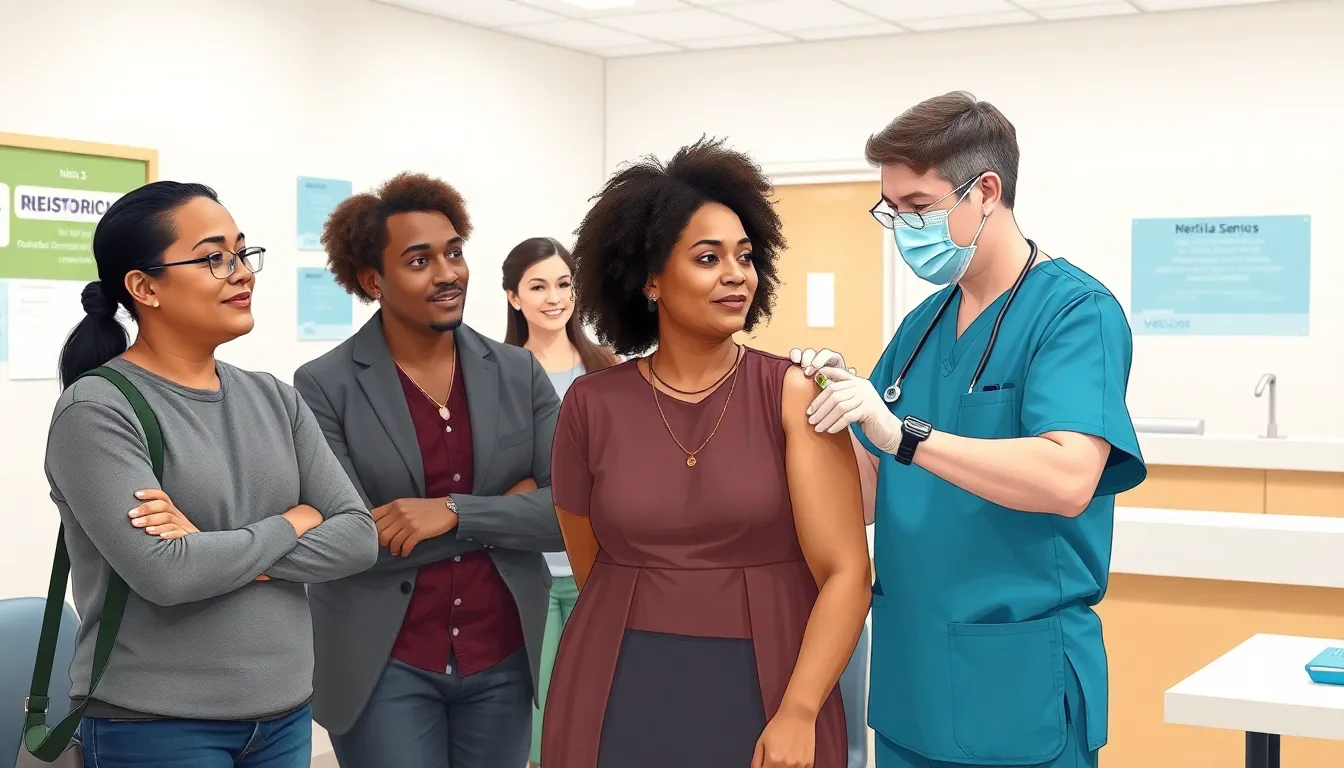Hepatitis B might sound like the name of a bad sitcom, but it’s no laughing matter. This viral infection can lead to serious liver problems, and the best way to avoid the drama is with a simple vaccine. For adults, understanding the hepatitis B vaccine schedule is crucial, and it’s not as complicated as assembling IKEA furniture.
Getting vaccinated is like giving your liver a superhero cape. The recommended schedule ensures maximum protection, so you can keep living life without worrying about unexpected plot twists. In this article, we’ll break down the dosage and timing, making sure you’re equipped with all the info you need to stay healthy and happy. After all, who wouldn’t want to be the star of their own health story?
Table of Contents
ToggleOverview of Hepatitis B
Hepatitis B is a viral infection that attacks the liver, leading to serious complications such as cirrhosis and liver cancer. It spreads through contact with infected bodily fluids. Transmission commonly occurs via unprotected sexual contact, sharing needles, and from mother to child during childbirth.
Chronic hepatitis B affects around 1.9 million people in the United States. Many individuals remain unaware of their infection because symptoms may not appear for years. Early detection is crucial since prompt treatment helps mitigate long-term damage to the liver.
Vaccination serves as the primary preventive measure against hepatitis B. The vaccine has been found to be over 95% effective in preventing infection when administered according to the recommended schedule. Adults, especially those at higher risk, significantly benefit from vaccination.
The hepatitis B vaccine consists of a series of shots given over a specified period. Typically, three doses are provided: the first dose is given at any chosen time, followed by a second dose one month later, and the final dose six months after the initial shot. Adhering to this schedule offers maximum protection.
Healthcare professionals recommend hepatitis B vaccinations for several groups. High-risk populations include healthcare workers, people with multiple sexual partners, and individuals with chronic illnesses. Those traveling to areas with high hepatitis B prevalence should also receive the vaccine.
In addition to vaccination, regular screening for hepatitis B is vital for at-risk individuals. Early identification allows for effective management and treatment of the disease. Awareness of the infection’s potential severity emphasizes the importance of preventive measures like vaccination.
Importance of Vaccination

Vaccination plays a vital role in preventing hepatitis B, a serious viral infection targeting the liver. Prioritizing vaccination safeguards against severe complications and promotes overall health.
Benefits of the Hepatitis B Vaccine
Protection against hepatitis B is one of the primary benefits. Studies show the vaccine achieves over 95% effectiveness when the recommended three-dose schedule is followed. Additionally, the vaccine helps prevent chronic liver conditions, including cirrhosis and liver cancer. High-risk populations, such as healthcare workers and those with multiple sexual partners, gain significant protection, reducing transmission within communities. Vaccination also promotes peace of mind, allowing individuals to focus on their personal and professional lives without ongoing health worries.
Risks of Hepatitis B Infection
Hepatitis B infection poses serious health risks. Without timely intervention, the virus can lead to chronic infections, affecting approximately 1.9 million people in the U.S. Long-term consequences include cirrhosis and an increased risk of liver cancer. Transmission often occurs through contact with infected bodily fluids, with individuals unaware of their infection due to absent symptoms. Regular screening remains crucial for early detection, enabling effective management and reducing complications. Understanding these risks emphasizes the necessity of vaccination as a preventive measure.
Hepatitis B Vaccine Schedule for Adults Dose
The hepatitis B vaccine is administered in a straightforward schedule. Understanding the timing and dosage ensures effective protection against the virus, which can lead to serious health issues.
Recommended Dosage and Timing
For adults, the hepatitis B vaccine is given in three doses. The first dose occurs at a chosen date. The second dose is typically administered one month after the first dose. Finally, the third dose is given six months after the initial dose. All doses enhance immunity against hepatitis B, with an efficacy rate exceeding 95% when the full series is completed. Individuals who miss a dose should consult a healthcare provider for advice on catch-up vaccination.
Special Considerations for Different Adult Populations
Certain groups require tailored vaccination strategies. Healthcare workers face increased exposure risk, so prompt vaccination is crucial. Travelers to regions with high hepatitis B prevalence should receive the vaccine well in advance of their trip. Adults with chronic illnesses or immune system compromises may need additional monitoring. Pregnant women are also advised to receive the vaccine to protect their newborns from potential transmission. Engaging in discussions with healthcare professionals ensures that everyone receives appropriate vaccination based on their specific health scenarios.
Effectiveness of the Vaccine
The hepatitis B vaccine offers strong protection against the virus, providing lasting immunity for those who complete the vaccination series.
Long-term Immunity
Long-term immunity following vaccination develops in over 95% of individuals who complete the three-dose schedule. Most people maintain protective antibodies against hepatitis B for decades. Studies show that individuals usually remain immune, even in cases where antibody levels decrease over time. Adults vaccinated during childhood often retain immunity into adulthood. Protective immune responses enable quick reactions against the virus in the event of exposure. Overall, the vaccine’s durability underscores its efficacy as a preventive measure.
Boosters and Revaccination
Booster doses aren’t routinely necessary for most vaccinated adults. CDC guidelines indicate that individuals with weak immune responses might require additional doses, especially if they are at high risk. Testing for immunity through serology can guide the decision for revaccination in specific cases. High-risk individuals should consult with healthcare providers to assess their need for boosters. Information from health authorities supports personalized vaccination plans that account for individual health needs. Understanding immunity aids in making informed health decisions regarding hepatitis B prevention.
Staying informed about the hepatitis B vaccine schedule is crucial for adults. By adhering to the recommended three-dose regimen, individuals can significantly reduce their risk of serious liver complications. This proactive approach not only protects personal health but also contributes to community well-being.
Engaging with healthcare professionals ensures tailored vaccination strategies that meet individual needs. Prioritizing vaccination and regular screening empowers adults to take charge of their health, leading to a healthier future free from the worries associated with hepatitis B.













